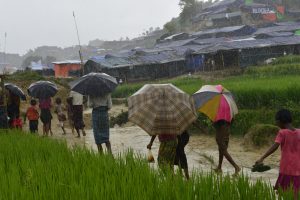Germany’s Federal Public Prosecutor has declined to open an investigation into genocide, war crimes, and crimes against humanity in Myanmar filed by a human rights group earlier this year.
In a statement yesterday, the advocacy organization Fortify Rights, which filed the complaint in January, said that it had been informed by the prosecutor on October 11 that it “would not be initiating an investigation into the crimes alleged in the complaint.”
Fortify Rights’ 215-page complaint requested that the German Federal Public Prosecutor investigate and prosecute those responsible both for the Rohingya genocide in 2016 and 2017 and for atrocity crimes committed since the military’s seizure of power on February 1, 2021. The complaint was made under the principle of “universal jurisdiction,” which allows the victims to bring charges in foreign courts against “particular crimes of international concern, no matter where the crime was committed, and regardless of the nationality of the perpetrators or their victims.”
While the Federal Prosecutor’s office has not made a public statement about the case, Fortify Rights said that it “underscored the absence of Myanmar junta leader Min Aung Hlaing and other named perpetrators in Germany as a decisive factor” in its decision not to open an investigation. The prosecutor also expressed their belief that a German investigation “would duplicate the work that the Independent Investigative Mechanism on Myanmar (IIMM) is currently undertaking,” the group said in its statement.
The Fortify Rights complaint was filed on behalf of 16 individual complainants from Myanmar, belonging to a representative cross-section of the military’s hundreds of thousands of victims. Around half were survivors of the Myanmar military-led “clearance operations” in Rakhine State in 2016 and 2017, an allegedly genocidal campaign that drove more than 700,000 civilians into Bangladesh. The rest were survivors and witnesses to atrocities carried out by the military since its seizure of power in 2021.
In yesterday’s statement, Fortify Rights CEO Matthew Smith said that the decision was “hugely disappointing,” but added that his organization “remain confident in the evidence and legal arguments in the complaint, and indeed, the German Federal Prosecutor’s office made clear that its decision was not based on the merits or strength of the evidence.” (The group’s complaint was accompanied by the submission of around more than 1,000 pages of annexes providing evidence for its allegations.)
The German complaint is just one of a handful of attempts to bring Myanmar’s ruling military clique to justice in foreign judicial systems under the principle of “universal jurisdiction.” In October, relatives of victims of alleged war crimes committed by Myanmar’s military filed a criminal complaint in the Philippines, following the initiation of cases in Turkey, Indonesia, and Argentina. The actions of Myanmar’s generals are also under investigation by the International Criminal Court and International Court of Justice, both based in The Hague.
In its statement, Fortify Rights said that there is “no reason to believe that this decision will hamper future universal jurisdiction complaints either in Germany or elsewhere.”
That may be the case, but the dismissal of the case reflects the difficulty in bringing successful universal jurisdiction cases. The number of obstacles that any such case is required to surmount is considerable. Domestic courts not only have to commit limited resources to investigations of complex foreign cases; they are nearly always required to do so without the alleged perpetrators being in custody. For a variety of reasons third governments are often reluctant to take foreign perpetrators into custody, even on those rare occasions when they are in a position to do so.
All told, a great number of individually improbable political circumstances have to align for a figure like Min Aung Hlaing ever to see the inside of a German or Argentinian prison cell.
That said, as a means of isolating the military, which has sound historical grounds to believe that it will never be held accountable for its actions, such legal avenues are well worth pursuing. And should Min Aung Hlaing and his cronies one day fall into the hands of a future federal democratic government in Myanmar, the evidence furnished by these various universal jurisdictions would likely play an important role in any future trials.

































